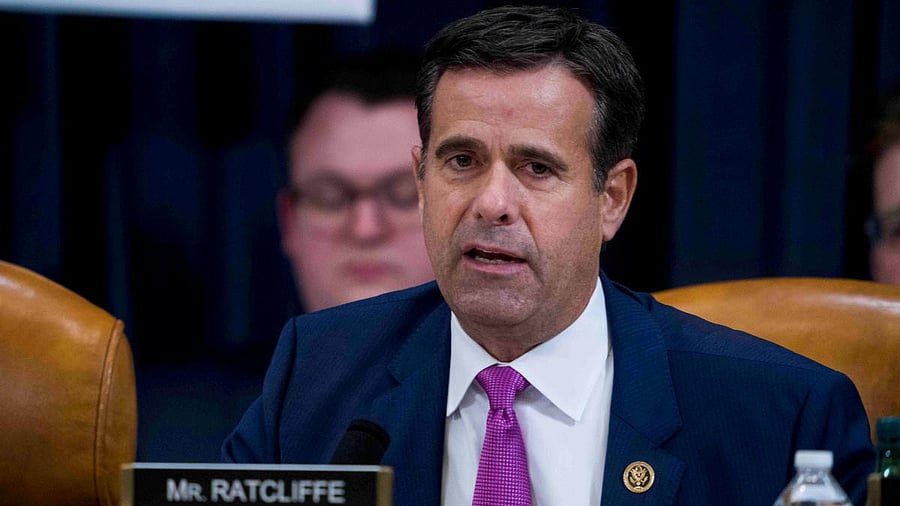
John Ratcliffe.
Credit: Reuters Photo
Washington: President-elect Donald Trump announced Tuesday that his nominee to lead the CIA would be John Ratcliffe, a former member of Congress from Texas who served as the director of national intelligence during Trump's first term.
Trump called Ratcliffe a "warrior for Truth and Honesty with the American Public" on his social media account. As the national intelligence director, Ratcliffe served as the president's chief adviser on intelligence issues.
In Congress, Ratcliffe fought on Trump's behalf, helping to pursue investigations into Hunter Biden, the president's son, and repeatedly criticizing the investigations into ties between Russia and Trump's 2016 campaign.
Ratcliffe's selection adds to the string of fierce Trump loyalists chosen so far for senior positions in the president-elect's administration. But while Ratcliffe firmly backed Trump's agenda as the director of national intelligence, he did not accede to every demand Trump made, something that could aid him as the Senate debates his confirmation.
His confirmation would most likely make Ratcliffe the most influential voice on intelligence matters in the next administration. Nominally, the CIA director is subordinate to the Office of the Director of National Intelligence. But the CIA director, with the power to appoint the senior spies stationed overseas and to conduct covert operations, arguably has more influence, and Trump has long viewed the CIA job as more important.
Some lawmakers Tuesday quickly praised the nomination, including Rep. Mike Turner, R-Ohio, chair of the House Intelligence Committee.
As CIA director, Ratcliffe will help "counter the serious threats posed by China, Russia, Iran and North Korea," Turner said.
When Ratcliffe was nominated to be director of national intelligence in Trump's first term, senators were initially hesitant to confirm him, seeing him as too partisan for the job, and he withdrew his nomination when it was initially offered.
Trump appointed Richard Grenell, who was the president's combative ambassador to Germany and had little experience in collecting intelligence, as the acting director. A few months later, when Trump again floated the idea of Ratcliffe's nomination, he was seen by senators as a more palatable choice.
As director of national intelligence, Ratcliffe warned about Chinese efforts to undermine Trump's 2020 reelection campaign, but he and his subordinates also did not shy away from saying Russia was trying to denigrate Joe Biden, Trump's 2020 challenger. Ratcliffe also exposed an Iranian plot to try to influence voters in Florida, which later led to indictments during the Biden administration.
Ratcliffe was deeply critical of how spy agencies looked at China. He argued that analysts had one standard for judging Russian influence operations and another for evaluating Chinese influence.
The Biden administration generally saw Iran and Russia as greater threats to conduct influence operations, but officials also said Ratcliffe had raised legitimate concerns. Officials in the current administration said they have worked to develop a single standard for evaluating influence operations.
As director of national intelligence, Ratcliffe undertook some actions that critics saw as partisan.
At the end of his first administration, Trump and key aides sought to declassify information that they believed undermined Democratic views about Russian influence operations in the 2016 election. Ratcliffe, over the objections of the CIA, declassified some of the material that had been requested by Sen. Lindsey Graham, R-S.C. (The material involved the Russians' analysis of what they thought Hillary Clinton was planning to do in the 2016 election.)
Ratcliffe also declassified material sought by Sen. Charles Grassley, R-Iowa, and others, about calls made by retired Lt. Gen. Michael Flynn, before he became Trump's first national security adviser.
But he also showed that he had limits. Some allies of Trump wanted Ratcliffe to release sensitive material gathered from intelligence files by Republicans on the House Intelligence Committee. The CIA opposed the release. Ratcliffe reviewed the material and ultimately sided with the agency.